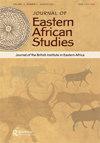Becoming Amhara: ethnic identity change as a quest for respect in Aari, Ethiopia
IF 0.6
3区 社会学
Q2 AREA STUDIES
引用次数: 0
Abstract
ABSTRACT Why do members of a southwest Ethiopian ethnic minority claim wanting to ‘stop being Aari’ and ‘become Amhara’? Since the mid-1990s, ethnic-based federalism has led many Ethiopians to identify more closely with ‘their’ ethnic group. This article presents a contrary case: building on two years of ethnographic fieldwork, I discuss Aari people’s quest to adopt the pan-Ethiopian identity of ‘Amhara’. I show that among Aari, a century of humiliation by northern Ethiopians has led to a profound sense of inferiority. The sense that all things ‘Aari’ are inferior makes it hard for people to connect to local culture and language as sources of pride and identity. In search of respect and self-esteem, Aari engage in linguistic, economic, and religious practices understood to affect ethnic identity change; by ‘becoming Amhara’ they hope to attain the recognition they were long denied. Contrary to what is widely assumed in present-day Ethiopia, this suggests that not all Ethiopians wish to make ‘their’ ethnicity the cornerstone of their identity. It also suggests that Amharization may be underway among other peripheral highlanders, sharing similar histories of humiliation and similar hopes for respect.成为阿姆哈拉人:在埃塞俄比亚的阿里,种族认同的改变是对尊重的追求
为什么埃塞俄比亚西南部的少数民族成员声称想要“不再是阿里人”而“成为阿姆哈拉人”?自20世纪90年代中期以来,以种族为基础的联邦制导致许多埃塞俄比亚人更紧密地认同“他们的”种族群体。这篇文章提出了一个相反的案例:基于两年的民族志田野调查,我讨论了阿里人对采用“阿姆哈拉”这个泛埃塞俄比亚身份的追求。我指出,在阿里人中,北部埃塞俄比亚人一个世纪的羞辱导致了一种深刻的自卑感。所有东西都是劣等的感觉,使得人们很难将当地文化和语言作为自豪感和身份的来源。为了寻求尊重和自尊,阿拉伯人从事语言、经济和宗教活动,这些活动被认为会影响种族认同的变化;通过“成为阿姆哈拉人”,他们希望获得长久以来被剥夺的认可。与当今埃塞俄比亚的普遍假设相反,这表明并非所有埃塞俄比亚人都希望将“他们的”种族作为其身份的基石。它还表明,阿姆哈拉化可能正在其他周边高地居民中进行,他们有着类似的屈辱历史,也同样希望得到尊重。
本文章由计算机程序翻译,如有差异,请以英文原文为准。
求助全文
约1分钟内获得全文
求助全文
来源期刊

Journal of Eastern African Studies
AREA STUDIES-
CiteScore
3.30
自引率
7.10%
发文量
12
期刊介绍:
Journal of Eastern African Studies is an international publication of the British Institute in Eastern Africa, published four times each year. It aims to promote fresh scholarly enquiry on the region from within the humanities and the social sciences, and to encourage work that communicates across disciplinary boundaries. It seeks to foster inter-disciplinary analysis, strong comparative perspectives, and research employing the most significant theoretical or methodological approaches for the region.
 求助内容:
求助内容: 应助结果提醒方式:
应助结果提醒方式:


